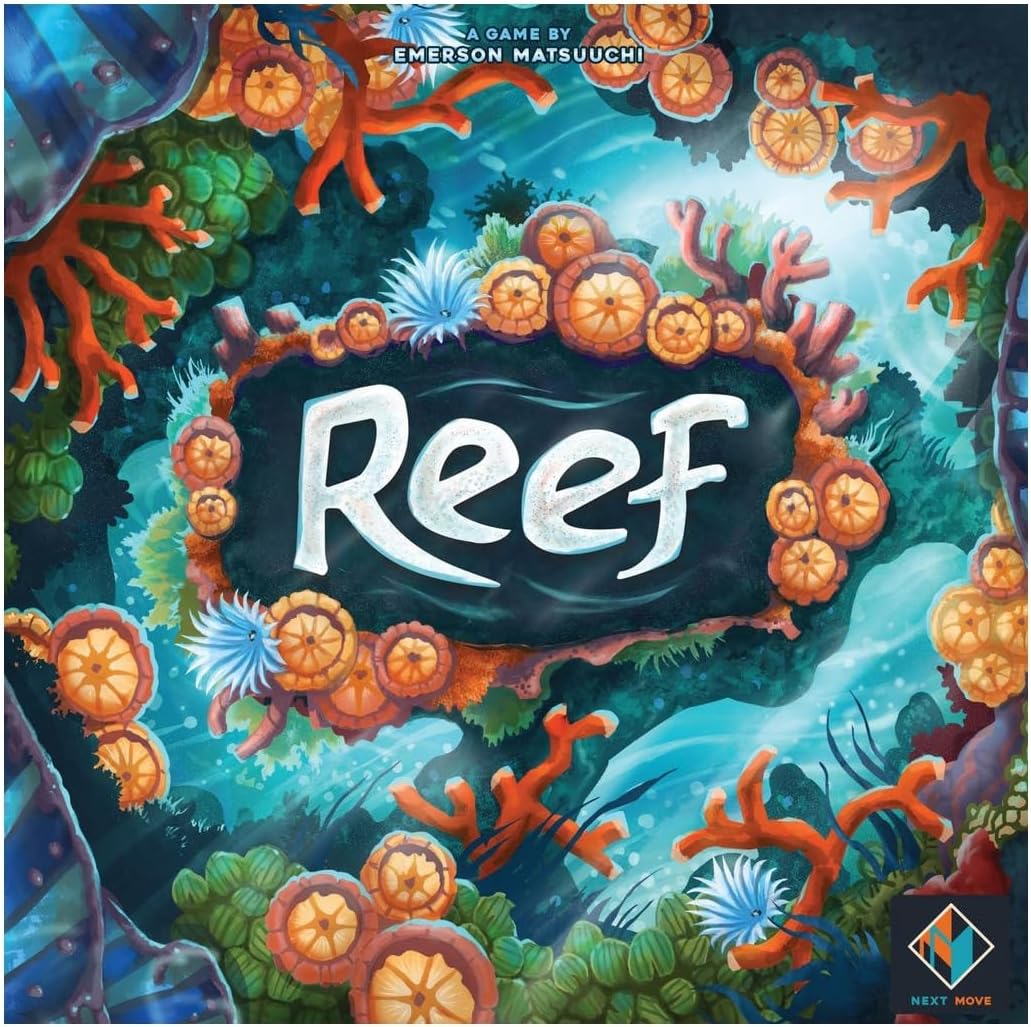
Next Move | Reef: Second Edition | Board Game | 2 - 4 Players | Ages 8+ | 30 to 45 Minutes Playing Time
FREE Shipping
Next Move | Reef: Second Edition | Board Game | 2 - 4 Players | Ages 8+ | 30 to 45 Minutes Playing Time
- Brand: Unbranded

Description
Reef shines brightly when it comes to its learning curve and accessibility. The rules are uncomplicated and can be explained in just a few minutes, making it a great gateway game for newcomers to the world of board games. The game mechanic of choosing or playing a card on your turn is easy to grasp, and the objective of creating specific patterns is straightforward. Ah, the ocean. The tranquility. The mystery. And beneath the waves, a whole universe bustles in vivid color, full of life and adventure. This is the realm of Reef, a delightful abstract strategy game designed by Emerson Matsuuchi. The game places you in the metaphorical fins of a coral reef architect, working to cultivate the most beautiful and diverse coral formations on the ocean floor. As soon as at least one color of coral pieces runs out, the game will end after players finish out the current round of play. When a player plays a card from their hand, it lets them both add more coral to their reef as well as score points if they also match the pattern shown on the card. To do so, they place the card they’re playing into their personal discard pile and take the 2 coral pieces shown on the top of the card. When played, I take the coral pieces shown at the top of the card and add them to my reef.
The result is a novel combination of a geographic puzzle and a card sequencing challenge. You need to set up cunning patterns ready for your next Reef cards while also carefully managing your hand to play them at just the right time. It is an easy game to learn but has a real depth of strategy, so it may take you some time to become master of the oceans.With its indirect player interaction, Reef creates a deceptively serene gaming experience that belies the subtle competition bubbling underneath. The shared card draft is where most of the interaction occurs, as players can potentially disrupt each other’s strategies by taking desired cards. However, the competition is always friendly, fitting well with the game’s relaxed, family-friendly vibe. Abstract strategy games seem to be on the rise in our hobby. Where they were once ignored due to their themeless nature and usually bland components, games like Azul, Santorini, and Onitama have reinvigorated the genre.
Every collection deserves a little bit of Matsuuchi, and if your tastes lean towards the abstract, then this is a great low stakes addition. Reefis very much a game about efficiency, every card you play gives you two coral and then scores you based on what you have present, but almost none of the cards give you the type of coral you need for the card's scoring rule, so you have to try and combo your cards. In an ideal world you'll manage to string them together so that each card sets up the next, but in reality you often have to play several cards to set up your next big score. It feels so satisfying when things go right, and equally frustrating when the cards you want just aren't appearing. Diving deeper into the game, the components of Reef are where the game truly shines, invoking the vibrancy of a coral reef in full bloom. This isn’t a game of muted tones and drab tiles, it’s a visual feast, boasting chunky coral pieces in a multitude of vibrant hues. The game’s coral pieces are durable and visually pleasing, with four different colors – yellow, purple, green, and red – and unique shapes for each. For the gamer at heart, the central draw of Reef will be in its card optimization. Game designer Emerson Matsuuchi cleverly created the cards to always have the pieces it gives you on the top half never help with the scoring on the bottom half. That means that you’ll need to plan ahead if you want to fully optimize your actions.The cards in Reef are well designed so that they are easy to read and clear, even from across the table. An added bonus in Reef is the plastic box insert that not only holds everything when on the shelf but also works to keep everything sorted during play. Timing is crucial. Sometimes, it might be worth delaying the scoring of a card to allow for more optimal placements. As the game progresses and the patterns on the player boards evolve, the tension builds, leading to a satisfying end-game climax. The scoring, done in secrecy on individual player boards, leads to exciting final reveals. Reef may not be a game of high-stakes negotiations or cutthroat competition, but it doesn’t need to be. The game remains consistently engaging, riding on its strategic depth and the indirect player interaction. Learning Curve and Accessibility After looking at their cards and what is face-up in the market, each player takes one of each coral type (there are four different types of coral each of which has its own colour) and places them on their board, which is a four by four grid. For the first few games, players are encouraged to use the centre four spots of their boards. Once players are more familiar with the game they should start using the outside edge instead. This creates a neat tension between grabbing cards that give you coral to build towards bigger scores, and potentially wasting the scoring potential of those cards, and trying to choose cards that will score every time you play them.
- Fruugo ID: 258392218-563234582
- EAN: 764486781913
-
Sold by: Fruugo
